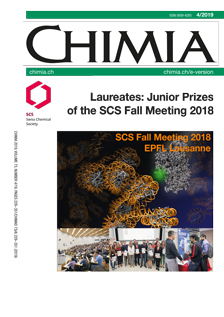Exploitation of Unconventional Electrophiles in Enantioselective Pd(0)-Catalyzed C–H Functionalizations
DOI:
https://doi.org/10.2533/chimia.2019.262PMID:
30975254Keywords:
Asymmetric catalysis, C–h functionalization, Heterocycles, Ligand design, PalladiumAbstract
Asymmetric metal-catalyzed C–H functionalization is a powerful strategy for the rapid generation of complex target molecules from simple precursors. While aryl (pseudo)halides have been used as electrophilic substrates in enantioselective Pd(0)-catalyzed syntheses of N-heterocycles, alternative partners for C–H functionalizations remain underexplored. Herein we describe the first application of ketene aminal phosphates as competent electrophiles in a Pd(0)-catalyzed desymmetrization. This transformation allowed the efficient synthesis of chiral isoindolines in a highly enantioselective fashion. Furthermore, intending to introduce sought-after perfluoroalkyl substituents, we explored intramolecular C–H functionalization of imidoyl chlorides resulting in the asymmetric preparation of previously inaccessible 1H-isoindoles. Tailored chiral monodentate ligands afforded high levels of enantioinduction in both transformations.Downloads
Published
2019-04-24
Issue
Section
Scientific Articles
License
Copyright (c) 2019 Swiss Chemical Society

This work is licensed under a Creative Commons Attribution-NonCommercial 4.0 International License.
How to Cite
[1]
Chimia 2019, 73, 262, DOI: 10.2533/chimia.2019.262.







